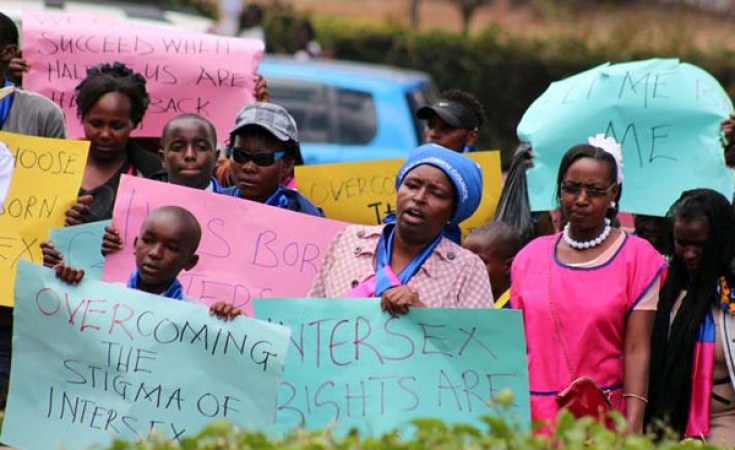Right from the preamble, the Kenyan constitution makes reference to the family. We made a commitment to nurture and protect the well-being of the individual, the family, communities and the nation.
The constitution makes an express and specific provision for children under Article 53. It makes the best interest of the child the guiding pillar in all matters touching on children.
Article 45 insulates the family unit as the natural and fundamental unit of society and the basis of social order.
The constitution makes no distinction between children whatsoever. Most of us believe that children are born either male or female. The sex of the child is taken with different sentiments and feelings from one community to the other. The boys and girls have different roles assigned to them by the society and the community they live in. This is closely linked to one's gender.
However, there are other children who are born in a category which is not exclusively male or female. These children are known as intersexuals. The law did not contemplate the existence of these category of people. The constitution nonetheless has come to the aid of such children. It is now possible for them to acquire the much needed statutory documents like birth certificates.
In Baby A's judgment, in Petition 266/13 (www.kenyalaw.com), the judge observed that Article 27(4) of the constitution 2010 must be read in its own context and language. It categorically states that there shall be no discrimination "on any ground" from that provision. An inclusive provision is not exhaustive of all the grounds specifically mentioned therein, including sex. That finding will therefore have to mean that intersexuals ought not to be discriminated against in anyway including in the issuance of registration documents such as a birth certificate.
We have no legal framework for the intersex children in Kenya. Policies are lacking which leaves them as an invisible group. No wonder the judge had to intervene. I recently bumped into the Persons Deprived of Liberty Bill 2014 which has defined who an intersex person is. We need laws for intersex people who are enjoying their liberty and freedom and those who are deprived of liberty and in prisons.
Given that there is no law in place that recognise or protects intersex children in Kenya, it is obvious that these children fall within the cracks. They suffer a lot of ridicule, insults and stigma in all walks of life ranging from the classroom to the playground.
Given that they are neither male nor female they cannot easily be incorporated in the day to day activities that come by way of facilities and benefits that other children enjoy as Kenyans.
This is largely informed by the fact that we do not have data around intersex people. They live in hiding and in fear in a society that does not have much to offer them. The time has come for diversity and the national values and principles of governance to take a new dimension that will go a long way in promoting the rights of these innocent children and long forgotten members of our family.
The starting point is to have data about the number of people we are dealing with. In Baby A's case, the Judge observed that, "...Whether there is need to collect data on inter-sex persons in Kenya. The petitioners urged the court to consider the issue of data collection of intersex persons.
The matter needs no extrapolation and on the same reasoning above, I also urge the first respondent (attorney general) to consider the issue of collecting such data as relates to intersex children and persons.
I therefore agree with the petitioners that such data is important as it is crucial in making and designing policies to protect intersex persons as a group of marginalised persons."
The judge then went ahead to direct the AG to submit to the court within 90 days of the judgment information related to the organ, agency or Institution responsible for collecting and keeping data related to intersex children and persons, generally. This is a very progressive step.
As a result of panic and fear, many parents who are blessed with intersex babies end up subjecting them to corrective surgeries to modify the genitalia and hormonal set up of these otherwise normal children. The operation is very invasive and is by nature irreversible. It usually leaves the patient with a permanent scar. This violates the intersex children right to bodily integrity, health and freedom from torture. In so far as there are no guidelines, in my opinion, this amounts to IGM (Intersex genital mutilation) or forced circumcision.
These operations bring to the fore a legal situation of competing rights within the family.
On one hand we have the parents who argue that they have to decide for the child while exercising parental responsibility over them while on the other hand we have the intersex child's right to bodily integrity and autonomy. Which of the two rights come before the other? Obviously the guiding principle lies at Article 53 which states that in such matters, we should be guided by "the best interest of the child" principle. It matters not whether it is an intersex child, a surrogate child or any other child. This is position is echoed by Section 4 of the Children's Act.
The doctors who carry out corrective surgeries for medical emergencies or other reasons must be guided by certain standards that will guarantee protection to intersex children so that the operations don't remain as experiments on the human body as was prohibited by The Nuremberg Code. The operation should be a last option.
There is a need for guidelines, rules and regulations for such operations or surgery on intersex persons in needy medical situations. The same regulations will insulate and protect the doctors from suits by the infants in the future.


